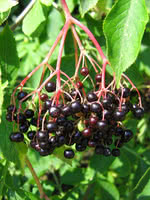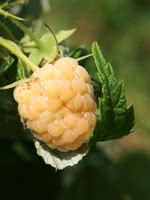Mon-Fri 9am - 5pm Mountain time
Black Elderberry vs Anne Raspberry
Sambucus canadensis
Rubus sp. Anne
NOT AVAILABLE THIS SEASON - MIGHT RETURN
NOT AVAILABLE THIS SEASON - MIGHT RETURN
Black Elderberry is a deciduous shrub native to eastern North America. You can plant this shrub in moist areas and it will help stabilize your soil. You can also use it on rural properties anywhere you'd use a lilac.
Black Elderberries are considered to be partially self-pollinating. So while they will still produce some berries without cross-pollination, planting with another variety will increase yields. Consider planting with Ranch Elderberry or Bob Gordon Elderberry.
Warning: the seeds, stems, leaves, roots, and uncooked berries of the Black Elderberry are poisonous to humans when eaten in quantity. You should cook the berries to make them safe for human consumption.
The Anne Raspberry is largely regarded as one of the best-tasting yellow raspberries. It is an everbearing variety that provides a mid-sized yield in early summer, with a more heavy crop later in the summer and into the fall. It blooms with white, rose-like flowers that give way to large, sweet, yellow berries that are quite firm.They are great for fresh-eating, or in preserves.
The Anne Raspberry is a primocane-fruiting variety, meaning that it produces fruit on first years' growth. Prune stalks down each winter or early spring to get higher fruit yields and easier harvesting.
Black Elderberry Quick Facts
Anne Raspberry Quick Facts
Toxicity: leaves, stems, and uncooked berries are poisonous to humans

